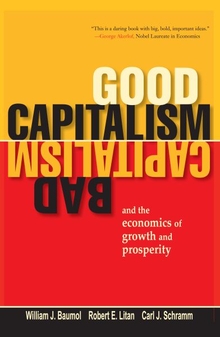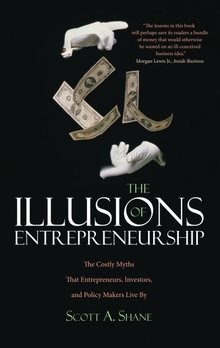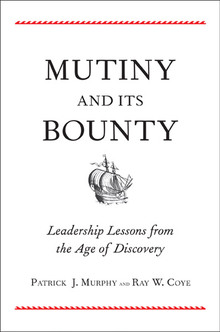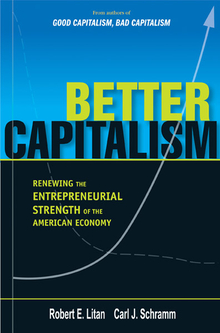Good Capitalism, Bad Capitalism, and the Economics of Growth and Prosperity
WARNING
You are viewing an older version of the Yalebooks website. Please visit out new website with more updated information and a better user experience: https://www.yalebooks.com
William J. Baumol, Robert E. Litan, and Carl J. Schramm
In this important book, three prominent economists propose that there are different varieties of capitalism in the world today--some good for economic growth, others decidedly bad. Writing in an accessible style, William J. Baumol, Robert E. Litan, and Carl J. Schramm documentfour different varieties of capitalism and identify the conditions that characterize Good Capitalism—the right blend of entrepreneurial and established firms, which can vary among countries—as well as the features of Bad Capitalism. They examine how countries catching up to the United States can move faster toward the economic frontier, while laying out the need for the United States itself to stick to and reinforce the recipe for growth that has enabled it to be the leading economic force in the world. This pathbreaking book is a must read for anyone who cares about global growth and how to ensure America’s economic future.
Listen to the authors' interview with Tom Ashbrook on National Public Radio's On Point or download directly with Windows Media Player or Real Player.
"In our lifetimes, humans passed a remarkable milestone. Most people now live in a capitalist economy. This is not, however, the end of history. As the authors of this path breaking book show, there are several distinctly different types of capitalism and it takes a mixture of two of these types to get all the economic, social, and political benefits that capitalism affords."—Paul M. Romer, STANCO 25 Professor of Economics in the Graduate School of Business at Stanford University
“Good Capitalism, Bad Capitalism tells us that capitalism comes in different flavors, and some of those flavors taste very much better than others. One of these forms of capitalism, entrepreneurial capitalism, is a special treat. It leads to growth and prosperity. The other forms are to be avoided; they lead to stagnation. This new view of the wealth of nations offers a guide to economic policy in all countries, from richest to poorest. This is a daring book with big, bold, important ideas.”—George Akerlof, University of California, Berkeley, Nobel Laureate in Economics, 2001
Publication Date: October 27, 2009
7 b/w illus.











